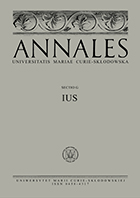Status byłych wspólników spółki cywilnej i rozwiązanej spółki cywilnej jako podmiotów gospodarczych a ich legitymacja na gruncie prawa publicznego gospodarczego –
wybrane przykłady
The Status of Former Partners of a Civil Partnership and a Dissolved Civil Partnership Company as Business Entities and Their Legitimacy under Public Economic Law – Selected Examples
Author(s): KATARZYNA KITA-WAŁĘKASubject(s): Civil Law, Public Law
Published by: Wydawnictwo Naukowe Uniwersytetu Marii Curie-Sklodowskiej
Keywords: partners of a civil partnership company; former partners of a civil partnership company; civil partnership company; tax law; party of the proceedings; legal interest;
Summary/Abstract: A civil partnership company and partners of a civil partnership, as well as former partners of a civil partnership after its dissolution, may have different legal statuse in various areas of law. The law should protect the interests of persons and entities that will be affected by the outcome of the case. Under civil law, the rights of former partners of a civil partnership company can be considered as protected, but the situation is different on a ground of public economic law, using the example of tax law. Some provisions have been introduced in legal act guaranteeing former partners the right to participate in the proceedings as a party in the event that they are entitled to refunds or overpayments of VAT tax from the State Treasury. In other areas, despite the content of Article 133 in conjunction with Article 115 of the Tax Ordinance Act, as well as the content of Article 25 in conjunction with Article 26 in conjunction with Article 33 of the Law on Proceedings before Administrative Courts, the jurisprudence does not grant former partners of a civil partnership company the status of a participant with the rights of a party in the proceedings, nor does it recognize their legal interest. For example, they do not have the right to question the decision on the assessment of VAT tax on the substantive level. This means that they cannot control the tax assessment decision, even though they are liable under Article 115 of the Tax Ordinance for tax liabilities of a civil partnership company. Moreover, the provisions of tax law do not expressly provide for the legal succession of former partners in the event of dissolution of a civil partnership. Such a situation is unacceptable if it prevents and closes the appeal route and the court route to a fair and public consideration of the case for former partners of a civil company, guaranteed by the provisions of the Polish Constitution.
Journal: Annales Universitatis Mariae Curie-Skłodowska, sectio G – Ius
- Issue Year: 70/2023
- Issue No: 2
- Page Range: 81-98
- Page Count: 18
- Language: Polish

